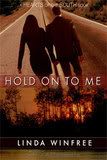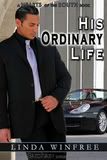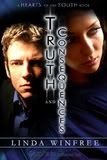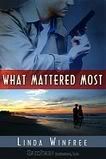To Blog or Not To Blog
 I've been considering starting up a personal blog. I had one about a year ago, but stopped posting there when we started Romance Worth Killing For. Seemed I'd be repeating myself here and there, and...why do that?
I've been considering starting up a personal blog. I had one about a year ago, but stopped posting there when we started Romance Worth Killing For. Seemed I'd be repeating myself here and there, and...why do that?It seems counter productive to start a personal blog when I often have a hard time working up adequate topics for this one. I also have a hard time just keeping my website updated, finding time to write and revise and crit others work, so adding one more thing to my list of to-dos is probably what's been holding me back.
On the other hand, I find myself wanting to simply...vent or chat, even if it's only to myself. And that doesn't seem appropriate for the more professional RWKF blog. Yet I do have some ideas for little snipits, quotes, thoughts that might stir my creativity as well as others'.
As you can see, I'm still undecided.
Most of you reading this have one or more blogs. How do you manage those? What are your guidelines for posting? Where does your audience come from? Why do it? What do you think you get out of it? What do you think others get out of it?
I'd love to hear your personal opinions on personal/professional blogging.
:~: Monday, November 27, 2006 :~:
Pushing Your Boundaries
 Recently, I had a long discussion with a published friend of mine. She was having issues with the second half of her book, which was due to her publisher in just a few weeks. The gist of her "issues" was that the root of the book was so very different from anything else she's written, she was feeling less than confident about the outcome. Now, I have complete faith in her. Aside from the fact she's published 30-some books, has a good sell-through record and recently hit the Walden's top 10 list with her June '06 release, she's a good story teller. She knows the biz. She under
Recently, I had a long discussion with a published friend of mine. She was having issues with the second half of her book, which was due to her publisher in just a few weeks. The gist of her "issues" was that the root of the book was so very different from anything else she's written, she was feeling less than confident about the outcome. Now, I have complete faith in her. Aside from the fact she's published 30-some books, has a good sell-through record and recently hit the Walden's top 10 list with her June '06 release, she's a good story teller. She knows the biz. She under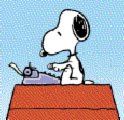 stands the craft. She's got a solid career that's growing as fast as she wants it to. For me, it's great to have a published writer-friend who's open about everything she's going through, even the worry over a book she's not sure about.
stands the craft. She's got a solid career that's growing as fast as she wants it to. For me, it's great to have a published writer-friend who's open about everything she's going through, even the worry over a book she's not sure about.Now, I'm no Freud, and there's no way I could ever reason as well as Aristotle, but listening to my friend's worry over her book was like an a-ha! moment for me. What she's experiencing now, so far into her publishing career, is the same thing new writers go through. Worry, doubt, neurosis over an idea or plot or storyline. After talking with her, I told her it seemed to me her issue wasn't that there was anything fundamentally wrong with her book, it was simply that the book itself is pushing her boundaries. It's so different from anything else she's done, and so outside the box, it's no wonder she's feeling a little anxiety. And while that can sometimes be scary as hell - career-wise - it can also be extremely exciting when you think about where you're headed and what you're accomplishing.
If you've seen my personal blog recently, you know I've been tip-toeing around my wip, reworking the first three chapters until it feels like my fingers are about to fall off from all the keystrokes I've been making. If I put together the different "versions" I've written, I'd probably be at least halfway through this sucker. As it is, I feel like I'm making no progress whatsoever because everything still feels off. After talking with my friend, however, and after thinking about where she is and what she's stressing over with her book, I realized the biggest problem I've been having isn't my plot, it's that I'm trying to work my way around writing about a topic that's out of my comfort zone. I've taken my hero out of his natural environment because it's easier for me to stick him somewhere else to get the ball rolling. In essence, I'm forcing things. I'm trying to make it work the way I want it, not the way the story needs to be written. Writing it the way I want to do it is easy, comfortable, like the last book I wrote. Writing it the way the character needs it to be will probably kick my ass before all is said and done.
So the question then becomes, do I want to push the boundaries? Write something that's going to challenge my abilities? Or do I want to take the easy route and write the same old thing?
I think I have my answer. Of course, it means starting over, but that's the joy of writing, right? If it were easy, we wouldn't be doing this day in and day out.
How do you push your boundaries? What writing risks do you take to challenge yourself?
:~: Friday, November 24, 2006 :~:
To e or Not To e . . .
Do you read e-books? For the longest time, I hadn't. I knew about them, was vaguely interested by the concept, but electronic books simply weren't on my radar.
Then Sharon Long over at Writeminded had a giveaway for a Samhain Publishing gift certificate. I won, got a free book, read it, but wasn't won over. Then, when Sharon's books began releasing from Samhain, I read those and a few by other Samhain officers. Well, the e-book bug bit. I like the instant gratification of choosing an e-book, downloading and being able to read it right then. (I'm not crazy about reading at my computer, but, hey. Instant books are cool). I'm not widely read among all the e-pubs -- I pretty much stick to Samhain (hey, they bought my stuff, and I'm loyal, LOL), although I've also read a few by Ellora's Cave.
So, do you e-book? What do you like about them? If you haven't taken the plunge yet, share your reasons. If you are an e-book fan, what authors, publishers, and titles would you recommend to the new e-book reader?
:~: Wednesday, November 22, 2006 :~:
The Villain Tri-Fecta: Part Three -- Your Villain's Journey
So, the short of it is, I don't know where the theory came from...originally. But it's worth considering as you create your villain and plot your book.
It took me a while to fully get this concept. I knew about it, thought about it, tried to apply it (and continue to try), but somehow I couldn't get around the fact that I believed:
- There can only be one hero in the book
- My villain couldn't be a villain if he acted like his own hero
Recently, while replotting and deepening my characters in Safe, I think a little twinkling of this finally shone through. Here's my take on it:
Here's my take on it:
Just as you can't have your hero/heroine reacting throughout the story to what the villain does, you can't have your villain reacting to your hero/heroine's attempts to thwart him.
Strong, compelling characters don't react, they act. They have their own goals, their own reasons for wanting what they want and their own ideas about how to get it.
Yes, even your villain has to have a rich, well-defined GMC. And, as I outlined in the first two blogs of my villain-themed posts, if his motivation is simply evil intent, your villain will be as interesting as cardboard.
Creating a journey for your villain is no different from creating a journey for your hero. It's just that the hero travels on the light side of the mountain, the villain travels on the dark side.
First, your villain has to be as worthy of your hero, just as your hero has to be worthy of your villain. A compelling story has an evenly matched hero/villain pair, although the story might start out with a far stronger villain, for which the hero has to attain greater skills to combat and overcome--Darth Vader to Luke Skywalker, for instance.
A riveting story has moments where your reader fears the villain may actually win. Where it seems as if the villain is stronger, smarter, more powerful than your hero and that in fact, it seems there is no way for your hero to prevail.
Second, for the villain to be a formidable opponent, he needs strong traits, both good and bad--intelligence, power, strength, greed, pride, ego and compelling motivation--stakes as high as you can make them--self-respect, livelihood, life itself, whatever is most important to your character.
Third, your villain can't be shy about using whatever is at his disposal to:
- Keep your hero from getting what he wants
- Keep your hero from getting in the way of what your villain wants
- Getting what he (the villain) wants
Your villain should not be on a straight and narrow path toward a goal. When your hero gets in the villain's way, your villain needs to outsmart your hero, use your hero's very traits (positive or negative) against him. Your villain needs a game plan, alternatives for when the road gets rocky, when plans go awry.
Then, of course, you have to push your hero past his limitations (physical, mental, emotional) and achieve positive change, save the day, attain his goal.
A truly formidable villain creates a truly heroic hero.
:~: Monday, November 20, 2006 :~:
Living In La-La Land
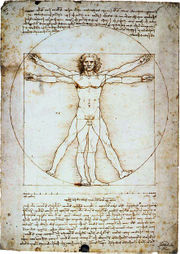 So amidst the chaos, I finally got to watch The DaVinci Code. I'll admit flat out that I didn't read the book. I'm not a big fan of Dan Brown's writing style, and because there was so much hype surrounding the book, I wasn't too excited to read it. I'm also Catholic, and I have to tell you, we heard so many bad things about the movie at church and from relatives, I had this image of a big-ol' catholic-bash fest, and no, I wasn't overly thrilled about seeing something like that. But now, after watching it, I'm wondering, what the heck is wrong with people?
So amidst the chaos, I finally got to watch The DaVinci Code. I'll admit flat out that I didn't read the book. I'm not a big fan of Dan Brown's writing style, and because there was so much hype surrounding the book, I wasn't too excited to read it. I'm also Catholic, and I have to tell you, we heard so many bad things about the movie at church and from relatives, I had this image of a big-ol' catholic-bash fest, and no, I wasn't overly thrilled about seeing something like that. But now, after watching it, I'm wondering, what the heck is wrong with people?Sure, it has some controversial theories, but people, come on, it's fiction. F-I-C-T-I-O-N. Is it the truth? No. Is it possible? Maybe. Anything's possible, that's what makes fiction fun to read and watch. Did I enjoy it? Yeah, I can say I did. The root of the story is a treasure hunt, and anyone who knows me knows I always love a good treasure hunt story. But it didn't make me change my beliefs or rethink my religion. I'm not about to run off and research Mary Magdalene to find out if Dan Brown's telling all of us the holy truth in the same way I didn't run off after watching Indiana Jones - Raiders of the Lost Ark to find out if the Nazis ever tried to confiscate the Ark.
It amazes me there's been such controversy over The DaVinci Code. It seriously floors
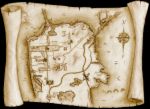 me that people can watch (or read) something and think what's being splashed in front of them is gospel. Are we - as a society - that brainwashed by what we see on TV and in movies that we believe anything set in front of us? I mean, if that's the case, then maybe there really is a map on the back of the Declaration of Independence! Come on, let's all go try to steal it and see for ourselves!
me that people can watch (or read) something and think what's being splashed in front of them is gospel. Are we - as a society - that brainwashed by what we see on TV and in movies that we believe anything set in front of us? I mean, if that's the case, then maybe there really is a map on the back of the Declaration of Independence! Come on, let's all go try to steal it and see for ourselves!Please.
I love books and movies rooted in history. If you look at the core of these stories, you learn something historical you might not have known before, but that doesn't mean they're always accurate. It's the difference between fiction and nonfiction. I wrote a book a couple years ago that was deeply rooted in Mexican history and the Spanish conquest. I had a lot of fun researching that book. A lot of the history in it is accurate to the letter, but is the story true? Heck no. It's fiction. I would never in a hundred years expect someone to believe what I wrote was truth. It's not meant to be, it's only meant to entertain. And I don't think Dan Brown ever claimed The DaVinci Code was historically accurate, either.
How do you all feel about fiction that plays on or alters history? And if you watched or read The DaVinci Code, tell me what you thought of it. Did it cross a line for you? Or did you look at it as a work of fiction and nothing more?
:~: Friday, November 17, 2006 :~:
When It All Comes Together
Every time I failed, I got up, dusted off my ego, and tried again. It would have been so much easier to give up. I could have turned the course into nothing more than a glorified study hall. However, that's not really my style . . . I can't stand failure as a teacher, and when I mess something up, I usually go at it twice as hard.
This week, said course has started coming together. I'm not naive enough to think it's going to go well the rest of the year -- trust me, I'll be picking myself up and dusting off the ol' ego again. Probably like next week! But, I can see the overall picture of this course coming together, I can see the individual elements falling into place, and I can see it working at some point.
Sounds like writing a book, doesn' t it? It sure does to me, from inception of the idea through all the trials of plotting and writing, until it all begins to come together and one finally gets to write THE END.
Can you think of a better feeling?
:~: Wednesday, November 15, 2006 :~:
The Villain Tri-Fecta: Part Two -- Your Villain In Conflict
Characterization is the cumulative affect of things you assign your character: eye and hair color, height and weight, attitude, disposition. Character is what he's really made of; what oozes out of his pores once he's squeezed by conflict.
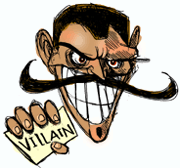 A character without conflict isn't a character at all, just a place holder. While that might suffice for those quickie stand ins--the waitress, the gas station attendant, the next door neighbor--it won't work for anyone in your plot that matters. Namely your hero, your heroine and your villain.
A character without conflict isn't a character at all, just a place holder. While that might suffice for those quickie stand ins--the waitress, the gas station attendant, the next door neighbor--it won't work for anyone in your plot that matters. Namely your hero, your heroine and your villain.Villain's, IMHUO, are as important as your hero/heroine. Arguably, even moreso. (I'm talking Romantic Suspense here, since that's what I write.) I, personally, don't like that idea, because, as I mentioned in my last post, I don't particularly like creating villains. Or, I should say deep villains. For me, staying on the surface is much more comfortable.
But comfortable isn't enough for memorable, compelling villains.
So toss as much conflict at your villain as you do your hero and heroine. And make it complex.
Your villain's external goals/wants will make him identifiable to a wide audience--money, power, position, professional success, the attentions of someone, the possession of something.
Most of your villain's external conflict will stem from your hero's actions in deflecting your villain's progress toward his goals, or your hero somehow standing in your villain's way of reaching those goals. I'll talk about this in the next post: The Villain's Journey -- A Formidable Adversary For Your Hero.
Your villain's internal goals/wants will make him sympathetic--love, respect, comfort, understanding, sense of self.
And this is where you can deepen and complicate your villain into a truly memorable character.
Most of your villain's internal goals/wants will stem from his past and his personality. As I discussed in the last post, each one of us in unique--created from a complex blend of situations, attitudes, preferences, experiences from our youth.
Some people spin their life lessons in a positive way, some spin them in a negative way. Your villain, like all your other characters, has to do both.
Donald Maass' book: Writing the Breakout Novel Workbook gives several suggestions for doing this. I've taken those suggestions and given a few examples.
Donald Maass suggests giving your character two deep and opposing wants.
- For example: the desire to be both feared and loved.
To deepen that conflict, make the opposing items mutually exclusive.
- For example: A man who wants to portray both reasonable flexibility, yet maintain ultimate control.
Maass also suggests defining your antagonist's deepest character trait, then the opposite of that trait and finding moments when your antagonist must display the opposite trait to achieve his goal.
- Here I'll use an example from my ms Safe: Saul's (villain) defining character trait is the need to maintain total control. His goal is to become the most successful terrorist smuggler in Baja. Because he doesn't have the necessary contacts and one of his employees (Rio/hero) does, Saul must acquiesce to some of his employee's demands or risk losing him, and consequently the smuggling operation, until Saul has developed his own contacts and no longer needs Rio.
Which ties in with another technique Maass suggests: naming several things your villain would never say, think or do, then create situations where he must say, think and do them to reach his goal.
- Again, in my ms Safe, my villain has to (say) apologize (never--he's always right), (think) decide on an alternate plan (never--no one challenges him), (do) play mind games with the heroine (never--he wouldn't stoop so low). All three of these things he must to do get around the roadblocks created by the hero and heroine in the story.
More on that in my next post: The Villain's Journey -- A Formidable Adversary For Your Hero.
How do you create conflict in your villains?
:~: Monday, November 13, 2006 :~:
When Something Just Feels Wrong
 Winter's hit the Pacific Northwest. Hard. We had a beautiful Indian summer, then November 1st, all hell broke loose. Wind, rain, more wind, more rain. It makes going outside a whole new experience.
Winter's hit the Pacific Northwest. Hard. We had a beautiful Indian summer, then November 1st, all hell broke loose. Wind, rain, more wind, more rain. It makes going outside a whole new experience.This weekend I went on a writer's retreat to the beach. It stormed there, too, on and off, but I have to say there's something about watching a storm blow in from the ocean and pelt the house with rain that's calming. I never have this feeling at home when the rain's pounding the siding, but at the beach it can almost be . . . inspiring.
Almost.
This weekend it was inspiring for everyone but me. I went to the beach with a goal. To finish a proposal - three chapters and a synopsis. No big deal. I mean, heck, I already had the chapters basically done. They just needed tweaking. It was the synopsis (or suckopsis in my case) that needed writing. I'm the one who always meets my goal in our group. I'm the one who pushes everyone else to meet their goals, to pull out the whip and tell everyone to quit gabbing and get back to work. However, this time, something wasn't right. When I got to the beach, opened my computer and started skimming through my chapters, I realized the synopsis was the least of my worries.
For a while now I've been avoiding this proposal because something I haven't been able to put my finger on has felt off. So off in fact, I wrote the first three chapters, skipped the synopsis and moved on to a different proposal. I told myself it was because the second idea had hit me so fast I needed to get it out, but now I know that's not the case. I dove into the second proposal and finished it because it was right. It worked. But this one - the one that must come first in the connected book "plan" is no where near being done, and I'm sure it's because something about it isn't right.
I'm an instinctive writer. Pushing through doesn't usually work for me, and in this case it's true again. Instead of writing this weekend like I'd hoped, I spent the time angsting and debating and thinking about where I'd gone wrong. I stared out at the crashing waves, watched the rain douse the house, even donned my coat and hat and walked miles up the beach while I tried to work everything out in my head. I brainstormed with my friends, took my frustration out on the ping-pong table and felt like a slacker for being the only one in the house who couldn't get anything done. Then I opened the computer again and stared at the blinking cursor.
Don't get me wrong. I wrote. A lot. But everything I wrote isn't working. I know I'm going to have to trash most of those pages.
So I'm basically starting over. I like the first chapter hook, but maybe that's my problem. I've decided to change locations, alter the backstory, bring the hero in faster, take out the connection to the first book so early in the story. It's still the same plot, it's still the same characters, it's just getting a make-over in the beginning. I keep coming back to the thought that if it doesn't feel right, it means something isn't right. And I just can't ignore that feeling.
It's no secret I hate opening chapters. Knowing where to start is something I've really worked on. I still don't feel like I have it figured out yet (obviously). But I know when something's not working from the get-go, it definitely won't work later down the line. So tell me, how do you deal with that "feeling" when you know something's just not working, but you can't figure out what? Do you push through and hope it works itself out? Do you restart until you work it through? Am I the only one who has this problem??? I'd love to hear your strategies.
:~: Friday, November 10, 2006 :~:
Why I Read
I can't conceive of not liking to read, although I'm well aware there are many people out there who don't read. I'm reading a couple of Kelly Gallagher books now on teaching literacy skills and motivating kids to read. One of those books it titled Reading Reasons. He has nine reasons why people should read.
Today, I thought I'd share with you my reading reasons. Then, after you've shared yours with me, I'll come back Sunday and post Gallagher's nine reasons.
My reasons:
1) It's fun.
2) It's an escape.
3) I can see things, go places, meet people I'd never get to meet in real life.
4) I like knowledge and I learn something new every time I read.
5) I like words. And ideas. I get both from reading.
6) Reading widely makes me a better writer.
7) It keeps the mind sharp.
8) I get more from reading than I get from watching a movie or television.
9) Reading forms connections -- my friends read and we talk about books.
Why do you read?
:~: Wednesday, November 08, 2006 :~:
The Villain Tri-Fecta: Part One -- Villains Are People Too
Memorable, compelling characters -- that's what good fiction boils down to. And while I have spent uncountable hours analyzing, developing and refining all my main characters, I constantly find myself shying away from digging too deeply into my villains. Honestly, they creep me out. I don't like thinking like them. Don't like seeing the world the way they do. Don't like the way their emotions seep into mine.
Honestly, they creep me out. I don't like thinking like them. Don't like seeing the world the way they do. Don't like the way their emotions seep into mine.
But if you want to develop memorable, compelling villains, that's what needs to be done.
Let's see Mike Rowe from Discovery Channel's show Dirties Jobs take that one on. Definitely dirty work.
We all understand how facing conflict builds character. But with the hero/heroine, we're building positive character -- taking the flawed to the realized, the wounded to the healed through each character's arc, an arc designed to fit each unique character's personal issue(s).
A villain, on the other hand, may learn through conflict and hardship, but he inevitably learns the wrong lesson.
Whether our characters are traversing the path of a positive or negative arc -- they're all real people. The villain was an innocent child at one point in his life. What changed? Why did it change? And most importantly, most revealing...how did he change in reaction to those events?
To paraphrase from a piece of E's last post...the challenges people face throughout life and how they respond to them shape the internal landscapes of each of us--in both good and bad ways.
Which means your villain has both good and bad qualities.
No one is bad all the time. Villains need positive traits, too. Traits that make him sympathetic to the reader. Traits that allow the reader to empathize, maybe even identify with the villain in a small way. Understand how he became what he had become.
Note: A compelling villain will often use his positive traits in organically negative ways. More on this next lecture: Your Villain in Conflict.
For the sake of example, let's say your villain's father was oppressive.
That one element could create a variety of negative issues for your villain:
- Maybe...the lack of all control made him crave it once he broke out on his own
- Maybe...he developed a hatred of certain types of men
- Maybe...he developed a hatred for women who allow men to dominate...or maybe he developed a preference for passive women...or maybe he prefers the dominatrix
- Maybe...he developed a hatred for women who allow their children to be mentally abused
- Maybe...he developed a fetish, something that gave him pleasure or allowed him to escape the domination
- Maybe...he mirrored his father's negative trait with his peers--became a bully, a gang leader...or maybe the opposite. Maybe he feared control and became a follower (note: this isn't a strong villainous trait, but might be a tendency he has, which would create great inner conflict. More about that next lecture: Your Villain in Conflict.)
To illustrate how the same situation could produce positive qualities depending on the person, let's take the examples above and turn them around.
The same villain, the same oppressive father. How did that affect your villain in a positive way?
- Maybe...the lack of control made him empathetic to others who lack control
- Maybe...he learned the right and wrong way to wield control
- Maybe...he learned to empathize with women who'd been in a controlling relationship
- Maybe...that fetish he developed was writing about controlling fathers who always die a horrible death. (We all know writing is a fetish. :-)).
Your villain's unique personality -- why will your readers remember him?
Like all characters, your villain's distinctive qualities should evolve organically. In other words, his uniqueness should stem from the way he reacted and internalized lifetime events (as shown above.)
There are as many reactions to a particular hardship as there are people on earth. It's the black sheep concept.
We all know or have heard of a family--same parents, same home, same school, equal treatment--where two of the kids turn out successful, compassionate, well-adjusted, and one who turns out a repeat failure, selfish, a social reject. Or two kids who follow in the family's traditions and beliefs, the other who's turned away from them.
Every living person is unique--thoughts, behaviors, preferences, dispositions, wants, dreams.
Apply that concept to your villain and watch him puff from a cardboard cutout into a living, breathing bad guy.
I'd like to hear how you all develop your villains. What do you think makes a villain unique? Memorable? Formidable?
Next week: Your Villain in Conflict.
:~: Monday, November 06, 2006 :~:
Filling That Bucket
Then I came in, sat down, popped the top off a diet coke and breathed. And that's when I laughed. Yeah, the weather definitely sucks today, but I can't change it. Running around like a chicken with my head cutt off isn't doing anything but making me crazy. Sometimes, bad things just happen no matter what you do.
I love writing, hence, why I am a writer. I tend to be the optimistic one in a group when rejections and stresses over the business threaten. Yes, I've struggled. And yes, I've had heartache where writing is concerned. But for the most part, I can look at a situation - good or bad - and see the silver lining in the clouds. For myself sometimes that's harder to do than it is to see the good in others' situations, but give me a couple hours to stew on something and I'm usually fine. I believe that everything happens for a reason. What you do with your experiences shapes you into who you are today. If you aren't happy with where you're at right now, you only have yourself to blame.
Linda posted about filling your bucket last week. The Pollyanna in me often already has a half-filled bucket where writing is concerned. But today - because the writing always picks me up whenever I'm down - I'm adding to it.
Why I Love To Write (And why I'll probably never stop.)
1. It keeps me sane.
2. I can escape from the real world.
3. There's power in the written word.
4. I love to read.
5. Books last forever (or seem to).
6. It challenges my mind.
7. It's lead me to some of the strongest friendships I've ever had.
8. It's taught me about goals and follow through and not giving up.
9. I feel like I've finally found what I'm supposed to be doing.
Staying positive and motivated about writing is hard, especially with rejections and waiting and all the negative stuff that happens in this biz. Sometimes its good to just remember why we started in the first place. I didn't start writing because I thought I'd be the next Nora Roberts (that came later, LOL). I started writing because of all the reasons I listed above.
Add to the list. What do you love about writing? And why do you keep doing it day after day even when things are tough?
:~: Friday, November 03, 2006 :~:
Having What It Takes, Part Deux -- The Attitude
That probably contributed to the wicked bout of clinical depression I battled last year. There were many contributors -- money issues, renovations from hell, a jam-packed teaching schedule, a couple of classes where I felt less than effective . . .
Several dozen rejections, being dumped by my agent . . .
I swear, some days it seemed like the end of the world every single day. I nosedived from being a realist to being a pessimist. My head was a scary place to be, and more than the writing suffered.
It's nearly a year later, and I'm still a realist. I still border on cynicism.
But I'm no longer an "Oh my God, the world is ending because I screwed up" person, for a lot of reasons. But the biggest is a really good friend who I see now really worked me over, adjusting my attitude, in the firmest, gentlest way possible.
She's unfailingly positive, even when life is at its yuckiest . . . and her life the last year has been far yuckier than mine. She is calm, she listens, she seeks solutions rather than focusing on the problems . . . and in many ways, she's the person I'm trying to be. We work together daily, which I've come to see as one of my greatest blessings.
Lately, we've embarked on a couple of missions together, one of which is establishing a more positive attitude among our high school students. We're on a bucket-filling challenge. The weird thing is, for a cynical realist like me, it's working. Not just with my kids . . . but with me. I'm looking at things even more positively than Mary has influenced me to lately. So even when major yucky stuff hits, as it has this week, I've been more equipped to handle it.
How does all this relate to writing? Because I know that when I return to writing and all the yucky stuff that the business sometimes entails, I'll have another tool in my box to help me deal with it. I'll have a better attitude, a better outlook.
How do you handle the yucky parts of the writing business? Who or what fills your bucket?
:~: Wednesday, November 01, 2006 :~:
The Daffodil Principle
Many of you may know it--The Daffodil Principle.
I can't remember when it was introduced to me, but it's been years. The principle behind the story has stayed with me, kept me going through the rough spots, not just in writing, but in life.
The basic principle echoes the ideas in the article Linda posted last Friday and speak to me on an elemental level. If you haven't read the article, it's worth your time.
For those of you who haven't been introduced to the Daffodil Principle, here it is...
The writing is not mine and leaves a bit to be desired (tortorous for me not to edit), but the message is worth slogging through the awkward prose. (And there are some great metaphores and descriptions in here, too.)
 Several times my daughter had telephoned to say, "Mother, you must come and see the daffodils before they are over."
Several times my daughter had telephoned to say, "Mother, you must come and see the daffodils before they are over."I wanted to go, but it was a two-hour drive from Laguna to Lake Arrowhead. Going and coming took most of a day--and I honestly did not have a free day until the following week. "I will come next Tuesday, " I promised, a little reluctantly, on her third call.
Next Tuesday dawned cold and rainy. Still, I had promised, and so I drove the length of Route 91, continued on I-215, and finally turned onto Route 18 and began to drive up the mountain highway.
The tops of the mountains were sheathed in clouds, and I had gone only a few miles when the road was completely covered with a wet, gray blanket of fog. I slowed to a crawl, my heart pounding. The road becomes narrow and winding toward the top of the mountain. As I executed the hazardous turns at a snail's pace, I was praying to reach the turnoff at Blue Jay that would signify I had arrived.
When I finally walked into Carolyn's house and hugged and greeted my grandchildren I said, "Forget the daffodils, Carolyn! The road is invisible in the clouds and fog, and there is nothing in the world except you and these darling children that I want to see bad enough to drive another inch!"
My daughter smiled calmly," We drive in this all the time, Mother."
"Well, you won't get me back on the road until it clears--and then I'm heading for home!" I assured her.
"I was hoping you'd take me over to the garage to pick up my car. The mechanic just called, and they've finished repairing the engine," she answered.
"How far will we have to drive?" I asked cautiously.
"Just a few blocks," Carolyn said cheerfully.
So we buckled up the children and went out to my car.
"I'll drive," Carolyn offered. "I'm used to this."
We got into the car, and she began driving. In a few minutes I was aware that we were back on the Rim-of-the-World Road heading over the top of the mountain. "Where are we going?" I exclaimed, distressed to be back on the mountain road in the fog. "This isn't the way to the garage!"
"We're going to my garage the long way," Carolyn smiled, "by way of the daffodils."
"Carolyn," I said sternly, trying to sound as if I was still the mother and in charge of the situation, "please turn around. There is nothing in the world that I want to see enough to drive on this road in this weather."
"It's all right, Mother," She replied with a knowing grin. "I know what I'm doing. I promise, you will never forgive yourself if you miss this experience."
And so my sweet, darling daughter who had never given me a minute of difficulty in her whole life was suddenly in charge -- and she was kidnapping me! I couldn't believe it. Like it or not, I was on the way to see some ridiculous daffodils -- driving through the thick, gray silence of the mist-wrapped mountaintop at what I thought was risk to life and limb. I muttered all the way.
After about twenty minutes we turned onto a small gravel road that branched down into an oak-filled hollow on the side of the mountain. The Fog had lifted a little, but the sky was lowering, gray and heavy with clouds.
We parked in a small parking lot adjoining a little stone church. From our vantage point at the top of the mountain we could see beyond us, in the mist, the crests of the San Bernardino range like the dark, humped backs of a herd of elephants. Far below us the fog-shrouded valleys, hills, and flatlands stretched away to the desert. On the far side of the church I saw a pine-needle-covered path, with towering evergreens and manzanita bushes and an inconspicuous, lettered sign "Daffodil Garden."
We each took a child's hand, and I followed Carolyn down the path as it wound through the trees. The mountain sloped away from the side of the path in irregular dips, folds, and valleys, like a deeply creased skirt. Live oaks, mountain laurel, shrubs, and bushes clustered in the folds, and in the gray, drizzling air, the green foliage looked dark and monochromatic. I shivered. Then we turned a corner of the path, and I looked up and gasped.
Before me lay the most glorious sight, unexpectedly and completely splendid. It looked as though someone had taken a great vat of gold and poured it down over the mountain peak and slopes where it had run into every crevice and over every rise.
Even in the mist-filled air, the mountainside was radiant, clothed in massive drifts and waterfalls of daffodils.
The flowers were planted in majestic, swirling patterns, great ribbons and swaths of deep orange, white, lemon yellow, salmon pink, saffron, and butter yellow. Each different-colored variety (I learned later that there were more than thirty-five varieties of daffodils in the vast display) was planted as a group so that it swirled and flowed like its own river with its own unique hue.
In the center of this incredible and dazzling display of gold, a great cascade of purple grape hyacinth flowed down like a waterfall of blossoms framed in its own rock-lined basin, weaving through the brilliant daffodils.
A charming path wound throughout the garden. There were several resting stations, paved with stone and furnished with Victorian wooden benches and great tubs of coral and carmine tulips.
As though this were not magnificence enough, Mother Nature had to add her own grace note -- above the daffodils, a bevy of western bluebirds flitted and darted, flashing their brilliance. These charming little birds are the color of sapphires with breasts of magenta red. As they dance in the air, their colors are truly like jewels above the blowing, glowing daffodils. The effect was spectacular.
It did not matter that the sun was not shining. The brilliance of the daffodils was like the glow of the brightest sunlit day. Words, wonderful as they are, simply cannot describe the incredible beauty of that flower-bedecked mountain top.
Five acres of flowers! (This too I discovered later when some of my questions were answered.)
"But who has done this?" I asked Carolyn. I was overflowing with gratitude that she brought me -- even against my will. This was a once-in-a-lifetime experience. "Who?" I asked again, almost speechless with wonder, "And how, and why, and when?"
"It's just one woman," Carolyn answered. "She lives on the property. That's her home." Carolyn pointed to a well-kept A-frame house that looked small and modest in the midst of all that glory.
We walked up to the house, my mind buzzing with questions. On the patio we saw a poster.
"Answers to the Questions I Know You Are Asking" was the headline.
The first answer was a simple one. "50,000 bulbs," it read.
The second answer was, "One at a time, by one woman, two hands, two feet, and very little brain."
The third answer was, "Began in 1958."
There it was. The Daffodil Principle.
For me that moment was a life-changing experience. I thought of this woman whom I had never met, who, more than thirty-five years before, had begun -- one bulb at a time -- to bring her vision of beauty and joy to an obscure mountain top. One bulb at a time. There was no other way to do it. One bulb at a time. No shortcuts -- simply loving the slow process of planting. Loving the work as it unfolded. Loving an achievement that grew so slowly and that bloomed for only three weeks of each year.
Still, just planting one bulb at a time, year after year, had changed the world. This unknown woman had forever changed the world in which she lived. She had created something of ineffable magnificence, beauty, and inspiration.
The principle her daffodil garden taught is one of the greatest principle of celebration: learning to move toward our goals and desires one step at a time -- often just one baby-step at a time -- learning to love the doing, learning to use the accumulation of time.
When we multiply tiny pieces of time with small increments of daily effort, we too will find we can accomplish magnificent things. We can change the world.
"Carolyn," I said that morning on the top of the mountain as we left the haven of daffodils, our minds and hearts still bathed and bemused by the splendors we had seen, "it's as though that remarkable woman has needle-pointed the earth! Decorated it. Just think of it, she planted every single bulb for more than thirty years. One bulb at a time! And that's the only way this garden could be created. Every individual bulb had to be planted. There was no way of short-circuiting that process. Five acres of blooms. That magnificent cascade of hyacinth! All, all, just one bulb at a time."
The thought of it filled my mind. I was suddenly overwhelmed with the implications of what I had seen.
"It makes me sad in a way," I admitted to Carolyn. "What might I have accomplished if I had thought of a wonderful goal thirty-five years ago and had worked away at it 'one bulb at a time' through all those years. Just think what I might have been able to achieve!"
My wise daughter put the car into gear and summed up the message of the day in her direct way. "Start tomorrow," she said with the same knowing smile she had worn for most of the morning.


